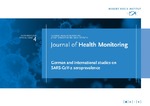German and international studies on SARS-CoV-2 seroprevalence
Poethko-Müller, Christina
Prütz, Franziska
Buttmann-Schweiger, Nina
Fiebig, Julia
Sarganas, Giselle
Seeling, Stefanie
Thamm, Roma
Baumann, Jan
Hamouda, Osamah
Offergeld, Ruth
Schaade, Lars
Lampert, Thomas
Neuhauser, Hannelore
Since the beginning of the year 2020, the SARS-CoV-2 coronavirus has spread globally at a tremendous pace. Studies
on the prevalence of SARS-CoV-2 antibodies in the population help estimate the number of people that have already
been infected. They also allow an estimate of the number of undetected infections i.e. infections that do not appear in
data on officially reported cases. The interpretation of study results needs to consider bias from selective sampling and
the diagnostic test properties. To promote networking and co-operation between scientists, the Robert Koch Institute
has compiled an overview of the seroepidemiological studies conducted in Germany on its website, which is regularly
updated. The RKI conducts searches, for example of press releases, study registry entries or preprint server publications,
and contacts the lead investigators of these studies. Of the 40 studies contacted so far, 24 have already provided
information (as of 25.06.2020). We can differentiate between studies of the general population, of selected population
groups such as healthcare workers, or of ongoing cohorts. This article provides an overview of such studies from Germany,
but also of selected international studies. A special focus is set on studies of children and adolescents, which are now
of particular interest due to the planned reopening of childcare facilities and schools.
Files in this item
No license information

